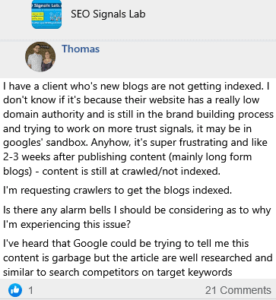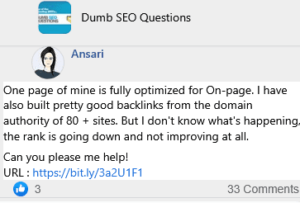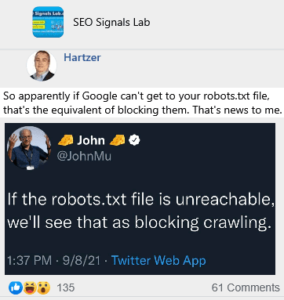Eliav
Google seems to prefer PR/News sites OVER real authority sites/experts blogs? is it a bug? new trend?

19 👍🏽19 27 💬🗨
Truslow
The favoring of news sites in this case is more likely to be a result of how the algo works more so than any conscious decision made by Google or anyone there.
The first thing here is that these are all subjective questions. If you ask 10 people what the best "anything" is – you're likely to get nearly that many different answers. Subjective terms and claims (i.e. "best" or "worst" or anything that requires an answer that is more opinion than actual facts that drive it) are interesting to watch right now. And they have been for a year or so.
In fact, I instruct our teams not to even use those types of subjective words in copy or anything right now. They're very volatile and you can't just go around saying something is the best or the top or the most popular without some soft of facts present to back up the claim.
Niche authority sites, while they may be authorities on the subject they talk about, they still have an agenda of some sort… and that agenda is almost certainly related to and biased by the niche they fill. It's hard to be objective about something when you have a predilection toward one side or the other.
News sites, while maybe not having as much authority on a given subject, do have the (albeit, often undeserved) reputation of at least trying to be objective about things. So, when asking a subjective question, the better answer is the most objective one.
It's a complex concept – so much so that most people just say, "Well Google doesn't even do that." But the truth is, they may not have any specific thing going on that does it – you can be certain by the things they say and the methods that they're potentially employing that it's the result their trying to achieve.
In my limited sampling of sites – maybe a dozen that I work on regularly, and a few dozen more where I consult and help develop and revise the strategies a few times a year – adapting content so that it makes no subjective claims or makes sure that any subjective claim is backed up by recognized and authoritative data and sources has done really well to get them out of these holes. You can say (and rank) for something saying it's the best if you have enough corroborating voices out there that agree with you. If you don't have that corroboration – best not say it.
Using this strategy has worked well to help these sites keep their authority and not harm anything that might add up to whatever "objectivity" score might be in play. Their rankings are better and in at least one case, we have a page that ranks for a query of "best" something – without ever making that "best" claim anywhere on the page.
Eric
While it's entirely true Google might have globally shifted the visibility of news sites, it's also possible that this is an isolate case for this specific keyword.
The way it works is as follows: For each keyword, click through rate and user activity dictates the trends that will surface.
If a keyword receives a lot of clicks on very recent publications / news, the algorithm will learn that this keyword is a time-sensitive keyword that requires more recent sites. Conversely, if most people are clicking on older, established listings, the algorithm will lean towards surfacing more long-term authority sites.
As the casino market is very volatile (with fluctuations all the time), the algorithm seems to have learned to reward newer information, possibly giving a slight priority to news sites. In the end, it's the algorithm trying to determine what humans want (and as we can see, nearly everyone is updating their pages with dates which indicate time sensitive documents). These documents also likely get the highest CTR which will help re-enforce the freshness factor.
Roger
It's pretty obvious what's going on. Any SEO who knows how to read Search Engine Result Pages (SERPs) can see it.
I will write this in the spirit of helping. 😉
Google is interpreting the SEARCHER INTENT for the word BEST as meaning that most searchers are satisfied with a review of several products. Sites like PCMag tend to satisfy users looking for reviews of certain kinds of products. There is no mystery about it.
Saying, Oh Google prefers PR/News sites is NOT an analysis, it's b1tching. Don't b1tch about the SERPs, that's just complaining, like yelling at the TV set. Does not help.
Be proactive. Study the SERPs, figure them out then mount your attack.
YOU have the advantage because you can be fast moving. Big sites move slow and are restricted in what they can do. 😉
If you do searches for televisions you're going to see a regular site called RTINGS dot com ranking for a whole bunch of TV type reviews, not what one would call PR/News sites. They are killing it with really great content. When I was searching for TV reviews I was happy and thrilled to read their reviews. They're doing an awesome job of it and deserve all their top rankings.
PCMag is not a news site. It started out as an actual magazine, I used to subscribe to it in the 1990's and it did reviews back then, it's why I subscribed to it. Today it happens to review a lot more things, which makes sense. All quality businesses are proactive and respond to trends. PC Magazine and their sister sites work hard at some of their reviews and they do a good job of it. There are some low quality pages though, which is why I prefer other sites now.
💟👍🏽10
The favoring of news sites in this case is more likely to be a result of how the algo works more so than any conscious decision made by Google or anyone there.
The first thing here is that these are all subjective questions. If you ask 10 people what the best "anything" is – you're likely to get nearly that many different answers. Subjective terms and claims (i.e. "best" or "worst" or anything that requires an answer that is more opinion than actual facts that drive it) are interesting to watch right now. And they have been for a year or so.
In fact, I instruct our teams not to even use those types of subjective words in copy or anything right now. They're very volatile and you can't just go around saying something is the best or the top or the most popular without some soft of facts present to back up the claim.
Niche authority sites, while they may be authorities on the subject they talk about, they still have an agenda of some sort… and that agenda is almost certainly related to and biased by the niche they fill. It's hard to be objective about something when you have a predilection toward one side or the other.
News sites, while maybe not having as much authority on a given subject, do have the (albeit, often undeserved) reputation of at least trying to be objective about things. So, when asking a subjective question, the better answer is the most objective one.
It's a complex concept – so much so that most people just say, "Well Google doesn't even do that." But the truth is, they may not have any specific thing going on that does it – you can be certain by the things they say and the methods that they're potentially employing that it's the result their trying to achieve.
In my limited sampling of sites – maybe a dozen that I work on regularly, and a few dozen more where I consult and help develop and revise the strategies a few times a year – adapting content so that it makes no subjective claims or makes sure that any subjective claim is backed up by recognized and authoritative data and sources has done really well to get them out of these holes. You can say (and rank) for something saying it's the best if you have enough corroborating voices out there that agree with you. If you don't have that corroboration – best not say it.
Using this strategy has worked well to help these sites keep their authority and not harm anything that might add up to whatever "objectivity" score might be in play. Their rankings are better and in at least one case, we have a page that ranks for a query of "best" something – without ever making that "best" claim anywhere on the page.
Eric
While it's entirely true Google might have globally shifted the visibility of news sites, it's also possible that this is an isolate case for this specific keyword.
The way it works is as follows: For each keyword, click through rate and user activity dictates the trends that will surface.
If a keyword receives a lot of clicks on very recent publications / news, the algorithm will learn that this keyword is a time-sensitive keyword that requires more recent sites. Conversely, if most people are clicking on older, established listings, the algorithm will lean towards surfacing more long-term authority sites.
As the casino market is very volatile (with fluctuations all the time), the algorithm seems to have learned to reward newer information, possibly giving a slight priority to news sites. In the end, it's the algorithm trying to determine what humans want (and as we can see, nearly everyone is updating their pages with dates which indicate time sensitive documents). These documents also likely get the highest CTR which will help re-enforce the freshness factor.
Roger
It's pretty obvious what's going on. Any SEO who knows how to read Search Engine Result Pages (SERPs) can see it.
I will write this in the spirit of helping. 😉
Google is interpreting the SEARCHER INTENT for the word BEST as meaning that most searchers are satisfied with a review of several products. Sites like PCMag tend to satisfy users looking for reviews of certain kinds of products. There is no mystery about it.
Saying, Oh Google prefers PR/News sites is NOT an analysis, it's b1tching. Don't b1tch about the SERPs, that's just complaining, like yelling at the TV set. Does not help.
Be proactive. Study the SERPs, figure them out then mount your attack.
YOU have the advantage because you can be fast moving. Big sites move slow and are restricted in what they can do. 😉
If you do searches for televisions you're going to see a regular site called RTINGS dot com ranking for a whole bunch of TV type reviews, not what one would call PR/News sites. They are killing it with really great content. When I was searching for TV reviews I was happy and thrilled to read their reviews. They're doing an awesome job of it and deserve all their top rankings.
PCMag is not a news site. It started out as an actual magazine, I used to subscribe to it in the 1990's and it did reviews back then, it's why I subscribed to it. Today it happens to review a lot more things, which makes sense. All quality businesses are proactive and respond to trends. PC Magazine and their sister sites work hard at some of their reviews and they do a good job of it. There are some low quality pages though, which is why I prefer other sites now.
💟👍🏽10
Vikram
Roger then what you think about topical authority, for example a website or magazine who's only reviewing and working in a specific niche and are not getting ranked just because a website which is reviewing every second product is getting ranked for every niche
Roger
Topical authority is an abstract concept that's used by the industry to describe being authoritative.
It's not really something used at Google, there's not a thing called topical authority.
And you know, when you talk about authority, you're really talking about links.
If you study links going back to the back rub paper, then you know what links are supposed to do they say what something is relevant for.
But now the link signal is very noisy so it cannot be depended on as a signal.
The link signal is so noisy that Google started using no follow links under certain conditions for ranking purposes.
And a lot of these newer algorithms will set the link signal aside and just focus on the relevance of a query to a web page, so that in those cases it's not even links that are playing a major role in ranking those pages.
So now, Google has been relying a lot more on on page factors and if you look at all the research a lot of it has to do with natural language processing, ai, machine learning related to what is a search query about and what is an individual page about.
MUM uses images as well as text in nearly every language of the world to answer a question. How would Topical Authority even fit in something like that?
Topical authority is not really a thing at Google as far as I know.
Roger then what you think about topical authority, for example a website or magazine who's only reviewing and working in a specific niche and are not getting ranked just because a website which is reviewing every second product is getting ranked for every niche
Roger
Topical authority is an abstract concept that's used by the industry to describe being authoritative.
It's not really something used at Google, there's not a thing called topical authority.
And you know, when you talk about authority, you're really talking about links.
If you study links going back to the back rub paper, then you know what links are supposed to do they say what something is relevant for.
But now the link signal is very noisy so it cannot be depended on as a signal.
The link signal is so noisy that Google started using no follow links under certain conditions for ranking purposes.
And a lot of these newer algorithms will set the link signal aside and just focus on the relevance of a query to a web page, so that in those cases it's not even links that are playing a major role in ranking those pages.
So now, Google has been relying a lot more on on page factors and if you look at all the research a lot of it has to do with natural language processing, ai, machine learning related to what is a search query about and what is an individual page about.
MUM uses images as well as text in nearly every language of the world to answer a question. How would Topical Authority even fit in something like that?
Topical authority is not really a thing at Google as far as I know.
📰👈
Press Releases Should Be Done Every 90-Days to Maintain Authoritative Links
How does Google distinguish the Search Results for Different Multi-Disciplines?
SEO to Rank and Build Authority for a Quiz Website
Embed the link of this post






